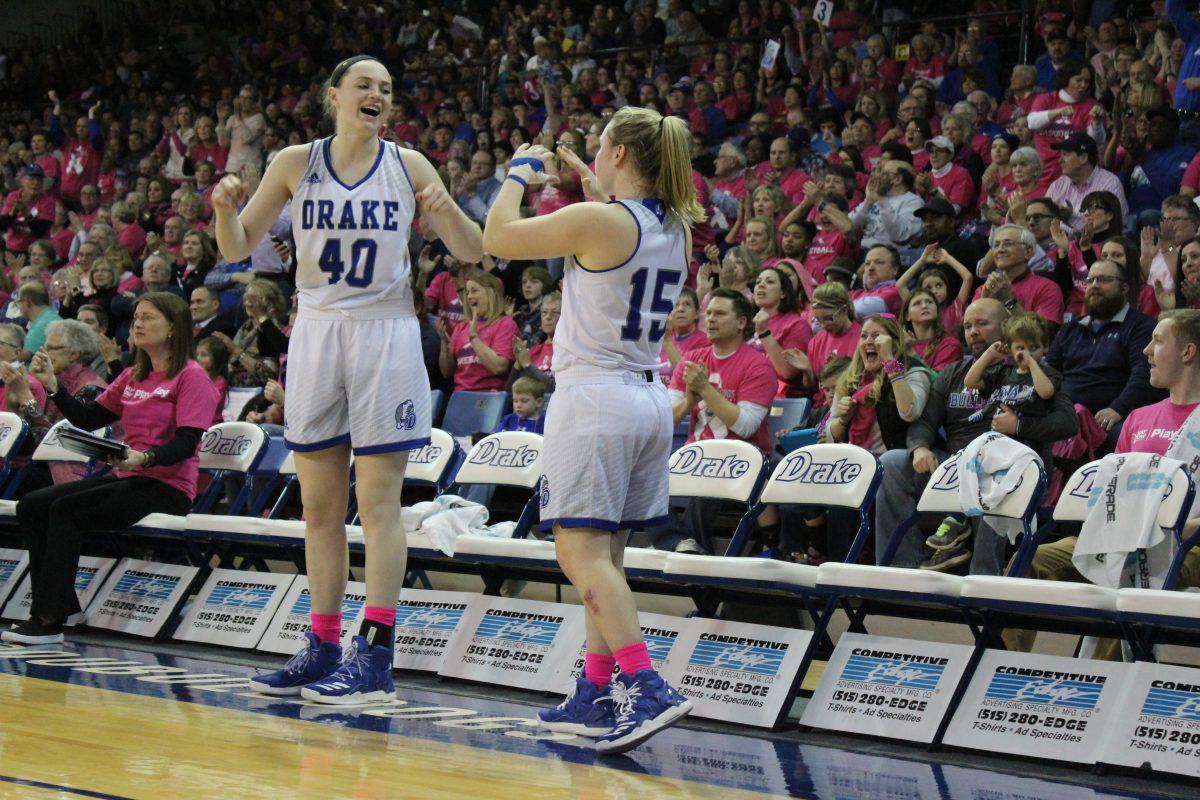Story by Elizabeth Robinson
When Title IX celebrated its 40th birthday last summer, there was a resurgence of excitement and enthusiasm toward women’s athletics. At the same time, though, most people had no grasp of the legislation’s impact on athletes today.
“No person in the United States shall, on the basis of sex, be excluded from participation in, be denied the benefits of or be subjected to discrimination under any educational program or activity receiving federal financial assistance.”
The words of Title IX, passed in June 1972 by Richard Nixon, changed the way women were treated in the athletic realm, in the U.S. overall and more specifically, at Drake.
When Carolyn Hill was an athlete at Drake nearly 35 years ago, the rules and attitudes enacted by Title IX were still new concepts, and women’s athletics programs were in the developing stages. Drake had just started setting its sights on the most promising female athletes.
“When I was in high school, there wasn’t really recruiting,” Hill said. “They didn’t recruit as much as they do now, because Title IX had just been passed. So as I came to college, actually the year after I got here, they started doing a little more recruiting, at that time for a lot of women, with the intent to build a strong program.”
Hill, who was a three-sport athlete in high school, wanted to further her athletic career. Drake allowed her to do so. Academics were important to her decision to attend Drake, but the fact that it was so supportive of women’s athletics played a big role in Hill’s choice to attend Drake.
Hill’s current position with Drake athletics as assistant Relays director has allowed her to see how women’s athletics have improved over the years.
“I’d say it’s probably a 360-degree difference from when I was here as a student-athlete,” Hill said. “We didn’t have practice uniforms, we had one game uniform, we all washed our own clothes and the weight room was just a little room by facilities down in the basement with a universal machine. So, compared to what they have now, it’s truly amazing.”
Sophomore softball player Hayley Nybo is one of the many Drake women’s athletes who is able to take advantage of the improvements to the program and the opportunities provided to her by Title IX. Nybo’s passion for softball led her from recreational play to a career as an NCAA athlete. Without Title IX, Nybo would not have been able to hone her talents and play at a Division I level.
“I would say that I am happy about it (Title IX) because of the opportunities that I have and the progressions that are still taking place now,” Nybo said. “If I couldn’t play sports, I don’t really know what I would be doing with my life.”
The legislation of Title IX spans not only to collegiate athletes, but athletic administration and the professional world as well.
Megan Franklin, senior woman administrator for Drake athletics, knows that the legislation has provided her many opportunities, including her career. The role of senior woman administrator was previously to ensure there was a woman on the athletics senior staff, but Franklin’s role is much more than that. Her responsibilities encompass men’s and women’s sports, sports medicine, strength, conditioning, compliance and academics. This involvement and obvious connection with athletics is something that Franklin has always known.
“I’ve never known any other way,” Franklin said. “I think it’s important because my generation and younger, we don’t even realize what those older generations ahead of me had to go through in order to have the opportunities be there for us now.”
As far as Title IX has come, today there is still a lingering discrepancy between men and women in the athletic and professional realms. In 2011, women held five of 120 athletic directors positions in Division I-A, no more than 4 percent overall, and 19 percent of all NCAA athletic directors were women. The low number indicates a pre-Title IX attitude.
Drake’s director of women’s studies, Nancy Reincke, agrees that, although there have been improvements, professional inconsistencies between men and women still remain.
“While the glass ceiling for women has eased up, there still aren’t the same opportunities for women as men,” Reincke said.
Drake is unique in the fact that the top three athletic administrative positions are held by women. Aside from Megan Franklin, the senior female administrator, is Sandy Hatfield Clubb, Drake’s athletic director and Renee Chestnut, Drake’s faculty athletic representative. Hatfield Clubb, who was also a collegiate athlete and coach, was the first woman to ever become a Division I athletic director in the state of Iowa.
The hiring of Hatfield Clubb continued to move Title IX forward significantly. Drake’s athletics administration continues to improve and make the legislation of Title IX more of its day-to-day business.
“I think we’re doing a good job at kind of keeping a pulse on interest and thinking about the opportunities for both men and women,” Franklin said. “And we’re being mindful of making sure we’re doing things like having Title IX audits and making sure we’re open to peer review and that we’re not saying we’re perfect but that we want to always be working on making sure we’re a point of pride and joy for our institution and that we’re complying and beyond.”


